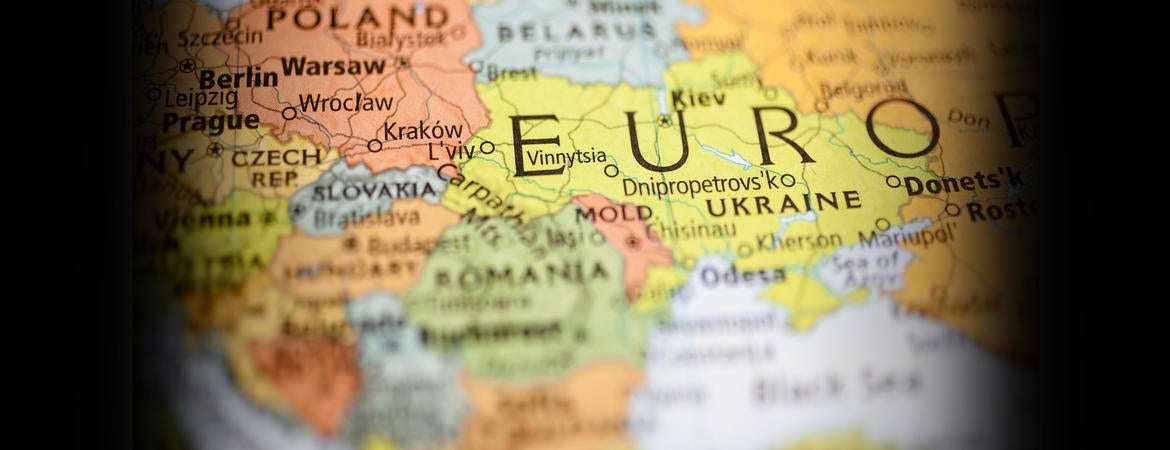
Piotr Górecki is a professor of history at UCR. He immigrated to the U.S. from Poland at 13 years old, and his parents were young adults and members of the Polish Resistance during World War II. His father was a Holocaust survivor. Górecki’s research specialty is Polish and Eastern European history during the Middle Ages. He maintains an active interest in the current affairs of Europe — especially as it pertains to democracy and threats to it.
Q: Should Eastern European countries, including former parts of the USSR, be concerned Putin’s aggression won’t stop at Ukraine?
A: Yes, in the first order, or sequence, the Baltic States, and, slightly behind them, Poland. Especially that northern tier of East Central Europe, a tier that also includes Belarus and Ukraine, has been an intense focus of Russian empire-building and domination — consistently destructive — whenever that empire-building has had a resurgence, from the late 17th century onward.
Under Putin, we have a moment of that resurgence. Please don't misunderstand me: that resurgence is not inevitable, or somehow essential; it does not, in some essential view, define Russia or the Russians. However, it is a historic tradition, one which is now in a state of a toxic, destructive revival. Vladimir Putin actually said, several times, that the dissolution of the most recent Russian empire (the Soviet Union) is a great tragedy. He is acting on it. If he is not successfully stopped, we don't know where he will stop. So that concern is entirely warranted.
Q: Putin’s Feb. 21 speech referred to restoring not the Soviet Union, but the Russian empire as it existed prior to 1917. That means all of the former Soviet states, but also a large part of Poland, including Warsaw, which was part of the Russian empire. Should this distinction be viewed as significant, or as saber-rattling?
A: I need to question two assumptions behind this question. First: saber-rattling can be significant. Or, it can become significant over time, and, before it becomes significant, it can serve as a warning benchmark, a threat. Into which the “rattler” can tap over time, after acquiring the resources for escalation.
And that gets me to the second assumption: that there is, in some sense that really matters, a real difference between the former USSR and the pre-1917 Russian empire. I am convinced that for Putin there isn't. This is because he, and a small number of other ideologues of Russian nationalism, seem to have produced a weird hybrid of the Russian imperial and the Soviet — especially Stalinist — past, as the idealized role model of Russia at its strongest and most vital. They are nostalgic for that past; and — as Putin has actually announced several times he wishes to do — intend to restore aspects of that past. One key, continuous aspect of that past is territorial expansion and geopolitical domination. This is why, geographically speaking, the difference between the pre-1917 empire and the pre-1989 Soviet Union is largely unreal. And so, I am afraid that the “distinction” posed by this question doesn't exist.
Q: Has the U.S. and NATO response been appropriate thus far? Can you describe the line President Biden and other NATO leaders are walking?
A: It has been appropriate, even though it comes late. I completely support, and agree with, the response to the Ukraine crisis by the Biden administration, and by the president individually — to the iota. The adamant refusal to a demand that some countries, by virtue of their location, are appropriately situated in some kind of special, extraterritorial zone of interest, and veto power, of other countries (here, of course, Russia) is especially important. Europe cannot return to that earlier status quo; America cannot allow it.
Re. the “line”: actually, there are two lines. The first is the possibility of escalation of war between Russia and one or more of the major NATO countries. The second is the perspective of perpetual impunity of Vladimir Putin and his régime, depending on the outcome of the Russian-Ukraine war and its geopolitical results. The costs of crossing the first line are terrifying and obvious. The costs of crossing the second line — that once again, as after 2008, and in 2014, Putin will get away with what he is doing — are, in the long term, the certainty of confronting the first line all over again. And again. And again. And, every time, from a position that is weaker than it was the last time around. With inadequate action, the prospect of major war will grow, not diminish.
Q: Ukraine’s president is asking NATO to enforce a no-fly zone over Ukraine. This would mean U.S. fighter jets engaging with Russia. NATO thus far is rejecting that tact. Do you agree?
A: I agree with NATO policy that that would get us to, or inexorably past, crossing the line to war with Russia. But I am a bit cautious about that answer. If Russia still does not now have air superiority over all or most of Ukraine, then, in enforcing a no-fly zone, we would not exactly be “engaging” with Russia. But it is still a horrible, monumental risk. So I agree with the present policy.
Q: What more should NATO be doing?
A: Send Ukraine, as rapidly as possible, the weaponry they need to resist the Russian invaders. This is crucial. Anti-tank, anti-aircraft, and other weapons; with a final abandonment of the brain-dead distinction between “offensive” and “defensive” weapons. This is being done now, which is good, and so my answer to “what more?” is: more. More of what the Ukrainians ask for; more of what they need. NATO in general, and specific countries — the United States under Barack Obama, Germany until four days ago, NATO in general — have been shamefully, inexcusably late in doing this. Even though, on this one, I am not really optimistic, it looks as though Putin, and the (atypical) face of Russia he represents, just might get bogged down a bit in this one, thanks to the astonishing courage and pride of the Ukrainians in defending their country. Let's enhance that probability, and minimize his chances. In this regard, the Ukrainians are quite right that they are fighting for all of us.
On this subject, I might sound more hawkish than I really am. This is, however, a fairly basic argument for allowing a remarkably courageous country the possibility of self-defense. Diplomacy, which I support, can only succeed if one side to the negotiation is not vanquished. If it is, diplomacy becomes blackmail.
Q: As a native of Poland, are you moved by the response of the Polish people to the refugee crisis?
A: Of course! I am moved, and proud, at the massive outreach of support for Ukraine and the Ukrainians in general in the country where I was born and (almost) grew up. Housing, medical care, employment, personal contact at the border and beyond…
Here is one loss for Vladimir Putin … The Poles and the Ukrainians have, even until fairly recently, had their differences. Very complicated, very traumatic, multi-decade history. Poof! No one has done more than Putin in 2014, and now, to heal those differences, and to forge yet another vector of friendship and solidarity in “my” part of Europe. Congratulations, Volodya.
Q: Can you share the present mindset of friends and family in Poland?
A: In Poland, there is less of a sense that Poland, too, will get attacked in some foreseeable future. Although, there are some reasons to fear that possibility. A few days ago, my brother-in-law and our niece, who live in a village outside of Kraków, reported those emotions. Never, under any scenario, did they, or anyone they know (or, for that matter, anyone anyone in Poland knows), anticipate this kind of unilateral, vicious, ruthless aggression, Adolf-Hitler style, anywhere in our continent, in the 21st century. So that’s the mindset. The rest of the world, including the United States, is now facing an epochal choice.



